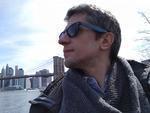Alberto Martinengo
Ricercatore/Ricercatrice a tempo determinato di tipo B
- Dipartimento di Filosofia e Scienze dell'Educazione
- SSD: M-FIL/04 - estetica
- ORCID: orcid.org/0000-0003-4832-2693

Contatti
- alberto.martinengo@unito.it
- https://unito.webex.com/meet/alberto.martinengo
Alberto Martinengo
Department of Philosophy and Education
University of Turin
Via Sant'Ottavio 20
10124 Turin
ItalyOffice address: Palazzo Nuovo | 2nd floor
- https://filosofia.campusnet.unito.it/persone/alberto.martinengo
- VCard contatti
- QRcode contatti
Presso
- Dipartimento di Filosofia e Scienze dell'Educazione
- Corso di laurea in DAMS
Discipline delle Arti, della Musica e dello Spettacolo - Corso di laurea in Filosofia
- Corso di laurea magistrale in CAM
Cinema, Arti della scena, Musica e Media - Corso di laurea magistrale in Filosofia
Curriculum vitae
 Curriculum Vitae
(0.8 MB)
Curriculum Vitae
(0.8 MB) Prodotti della ricerca
Tutti i miei prodotti della ricercaInsegnamenti
- Classici della filosofia II (M-FIL/04) (FIL0299)
Corso di laurea in Filosofia - Filosofia dell'arte (FIL0460)
Corso di laurea magistrale in Filosofia - Istituzioni di estetica (FIL0430)
Corso di laurea in DAMS
Discipline delle Arti, della Musica e dello Spettacolo
Attività in agenda
Organi
Ricevimento studenti
Su appuntamento scrivendo ad alberto.martinengo@unito.it
Please send a message to alberto.martinengo@unito.it




